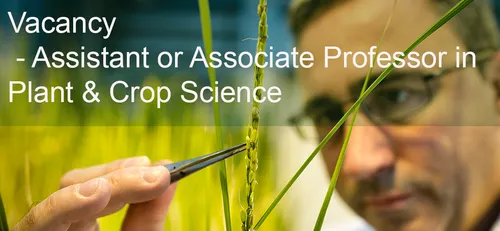Life Sciences News
See our Latest Journal Publications
Warwick named University of the Year for Teaching Quality
The University of Warwick has today been named the University of the Year for Teaching Quality and as runner-up for University of the Year by the Sunday Times’ Good University Guide 2022.
Press Release (17 September 2021)
Undergraduate degrees receive Royal Society of Biology Accreditation
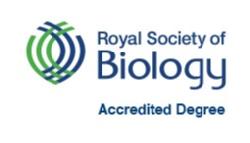 All of our undergraduate degrees have been successfully re-accredited by the Royal Society of Biology (RSB). RSB accredited degrees undergo rigorous, independent assessment to ensure a solid academic foundation in biological knowledge and key skills and prepares graduates to address the needs of employers.
All of our undergraduate degrees have been successfully re-accredited by the Royal Society of Biology (RSB). RSB accredited degrees undergo rigorous, independent assessment to ensure a solid academic foundation in biological knowledge and key skills and prepares graduates to address the needs of employers.
Graduates from Accredited programmes receive one year of free membership of the Royal Society of biology in their final year, opening up networks at a crucial time when applying for jobs. Whichever area of biology you wish to gain a career in, membership will help you:
- Stay up to date with what is happening across the life sciences
- Gain additional recognition for your skills and experience
- Develop your professional network
- Demonstrate your support for the future of biology
Interested in studying with us? Check out our bioscience degree courses
Ocean plastic has created a unique home for specialised organisms
Dr Robyn Wright, a former PhD student with Dr Joseph Christie-Oleza and co-supervised by Professor Matt Gibson, was recently interviewed for an article in The Guardian. Entitled ‘Welcome to the ‘plastisphere’: the synthetic ecosystem evolving at sea’ the article describes a new ecosystem of free flowing organisms inhabiting microplastics. The article also highlights Robyn’s latest publication in Microbiome on the analysis of PET (polyethylene terephthalate) degradation by marine bacteria.
Read the article (August 2021)
Academic Promotions
Congratulations to the following colleagues who have been promoted to Professor from 1 August 2021:
- John Clarkson
- Rebecca Freeman
- Miriam Gifford
- Vardis Ntoukakis
- Hendrik Schaefer
- Corinne Smith
- Mike Tildesley
- Phil Young
SLS academic recognised in Queen's birthday honours
 Professor Matt Keeling has been recognised in the 2021 Queen’s Birthday Honours List for services as an advisor to the government’s Scientific Advisory Group for Emergencies (SAGE) with an OBE.
Professor Matt Keeling has been recognised in the 2021 Queen’s Birthday Honours List for services as an advisor to the government’s Scientific Advisory Group for Emergencies (SAGE) with an OBE.
Commenting on his being awarded an OBE, Professor Keeling said:
“I'm absolutely thrilled by this award. This is great recognition of all the hard work of the entire Warwick group and the wider Juniper team over the last 15 months."
Press Release (15 June 2021)
Pint of science - join the free online festival
Pint of Science is back for 2021 as a free online festival packed with fun science related talks, debates and demonstrations. The international festival will see 68 events running online over 4 nights from Monday 17-Thursday 20 May. Life Sciences researchers are involved in the events below:
Tuesday 18 May 7-8pm Chemicals, Cocktails and Creativity – from molecules to masterpieces Join us for a discussion from four perspectives on the subject of botanical medicine with researchers from Chemistry, Life Sciences, WMS and Liberal Arts!
Find out more and register
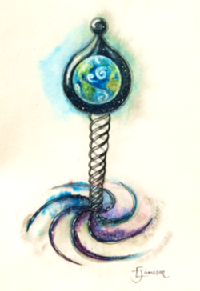 Creative Reactions Digital Gallery
Creative Reactions Digital Gallery
Creative Reactions is the science-meets-arts branch of Pint of Science to showcase research creatively. This can range from drawings, paintings to poetry, sculptures and video.
This year you can view all the Creative Reactions artworks in the form of a virtual gallery during May and June 2021. The School of Life Sciences’ Dr Ellie Jameson has four pieces of art included in the exhibition, where she re-imagines the Phages that she discovers in her vital research that uses these microbes to prevent bacterial infections.
You can explore the online gallery now at www.creativereactions.com and view the exhibition catalogue.
Ellie explains, “I use art to communicate my research to a wider audience who would not normally read scientific papers. My artwork has grown from general art to a focus on microbes and science when I started posting ink drawings on Twitter as part of #Inktober. I love to explore ideas and insights from my own work and the work of other scientists”
Scholarships available for taught masters starting in October 2021
Scholarships are available for those interested in studying a postgraduate taught masters course at SLS starting in October 2021. Our postgraduate taught (PGT) courses are 1 year full time (or 2 years part time).
School of Life Sciences (SLS) Excellence Scholarships
Up to two School of Life Sciences Excellence Scholarships will be awarded as a 50% reduction of course fees for the 2021/22 academic year. Applicants should have an excellent academic track-record.
Eligible courses:
- MSc Biotechnology, Bioprocessing and Business Management
- MSc Environmental Bioscience in a Changing Climate
- MSc Food Security
- MSc Medical Biotechnology and Business Management
- MSc Sustainable Crop Production: Agronomy for the 21st Century
Deadline: 1 June 2021
Clyde Higgs Scholarships
For 2021/22 up to five Clyde Higgs Scholarships, each worth £6,758, will be offered. This scholarship is available to British nationals only.
Eligible courses:
- MSc Food Security
- MSc Sustainable Crop Production: Agronomy for the 21st Century
Deadline: 1 June 2021
Starving Tuberculosis (TB) of sugars may be a new way to fight it
Tuberculosis is a devastating disease that claims over 1.5 million lives each year. The increase in TB cases that are resistant to the current antibiotics means that novel drugs to kill Mycobacterium tuberculosis (Mtb) are urgently needed. Dr Elizabeth Fullam and colleagues have successfully discovered how Mycobacterium tuberculosis uses an essential sugar called trehalose, which provides a platform to design new and improved TB drugs and diagnostic agents.
Press Release (15 April 2021)
Associate Professor/ Professor of Infection Microbiology position available
Applications are invited for an Associate Professor or Professor of Infection Microbiology to join the School of Life Sciences at the University of Warwick.
The School of Life Sciences has an international presence in microbiology, particularly within the global research priority of antimicrobial resistance (AMR). We aim to appoint an outstanding new academic staff member to strengthen research in cross-disciplinary approaches, complementing existing strengths in the School and leading a laboratory based research group in one or more of the following areas: antimicrobial resistance, anti-infective discovery, host-pathogen interactions and immunology including the microbiome, microbial genetics, virology and structural and chemical biology approaches to address human and animal infection.
Closing date: 30 April 2021
Construction completed on “world-class” biomedical research building
 Our impressive new IBRB biomedical research building has been completed. The new state-of-the-art lab spaces will support our interdisciplinary world-class research in neuroscience, microbiology and infection, and cell biology.
Our impressive new IBRB biomedical research building has been completed. The new state-of-the-art lab spaces will support our interdisciplinary world-class research in neuroscience, microbiology and infection, and cell biology.
Press Release (24 March 2021)
Science on the Hill event 30 March - New Scientists: New Research
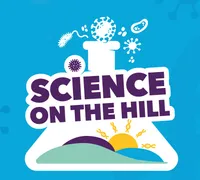 Science on the Hill is a programme of events jointly organised by the School of Life Sciences and Warwick Medical School - both based on the Gibbet Hill campus.
Science on the Hill is a programme of events jointly organised by the School of Life Sciences and Warwick Medical School - both based on the Gibbet Hill campus.
Our next event is on Tuesday 30 March, 7-8pm - New Scientists: New Research.
Hosted by Prof Kevin Moffat the speakers are Dr Erin Greaves from Warwick Medical School and Dr Ellie Jameson and Emily Hill from the School of Life Sciences.
Recruitment for 30 new PhD pandemic research scholarships opens today at University of Warwick thanks to over £3 million in donations
The search for 30 people to take up new PhD pandemic research scholarships begins today (Friday 19 March 2021) thanks to philanthropists donating to the University of Warwick’s newly created Institute for Global Pandemic Planning. The 30 new doctoral students will research the best ways for global leaders to respond to pandemics.
Mathematical epidemiologist Dr Mike Tildesley is among the academics who will be supervising the new PhD scholars.
Press Release (19 March 2021)
How bacterial traffic jams lead to antibiotic-resistant, multilayer biofilms
New insight on the physical interactions that take place between swarming bacteria when exposed to antibiotics could lead to novel approaches for treating infections in patients. The bacterial equivalent of a traffic jam causes multilayered biofilms to form in the presence of antibiotics, shows a study by Dr Munehiro Asally and colleagues.
Press Release (16 March 2021)
Hunting for life-saving phage in sewage
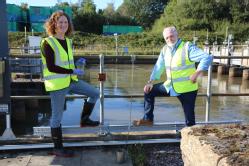 Dr Eleanor Townsend and Dr Ellie Jameson were part of a documentary on the ‘Secret Science of Sewage', aired on Thursday 18 March. The researchers were filmed collecting samples from Minworth Sewage works and characterising the phages they contain, as a possible solution in the fight against antimicrobial resistant bacteria. Dr Eleanor Townsend was filmed in the School of Life Sciences imaging suite, imaging the phages on the Transmission Electron Microscope. Dr Ellie Jameson discussed the results with Dr George McGavin.
Dr Eleanor Townsend and Dr Ellie Jameson were part of a documentary on the ‘Secret Science of Sewage', aired on Thursday 18 March. The researchers were filmed collecting samples from Minworth Sewage works and characterising the phages they contain, as a possible solution in the fight against antimicrobial resistant bacteria. Dr Eleanor Townsend was filmed in the School of Life Sciences imaging suite, imaging the phages on the Transmission Electron Microscope. Dr Ellie Jameson discussed the results with Dr George McGavin.
The Jameson laboratory, at the University of Warwick, is developing phage cocktails to prevent the most common UTI infections (Enterobacteriaceae) that can lead to severe complications. Findings have recently been published on the use of phages to prevent catheter biofilms: Townsend, E. M., Moat, J., & Jameson, E. (2020). CAUTI’s Next Top Model–model dependent Klebsiella biofilm inhibition by bacteriophages and antimicrobials. Biofilm, 2, 100038. This involves hunting for novel, diverse phages in sewage and characterising them.
The Jameson laboratory has also supplied their rigorously characterised phages for compassionate use in patients with no other treatment options. This work was recently peer reviewed and accepted in the journal; Phage - Townsend, E., Kelly, L., Gannon, L., Muscatt, G., Dunstan, R., Michniewski, S., ... & Jameson, E. (2020). Isolation and characterisation of Klebsiella phages for phage therapy. bioRxiv.
Work is currently being expanded to design phage cocktails to treat pneumonia, bloodstream infections and inflammatory bowel disease in collaboration with Professor Trevor Lithgow at Monash University.
BBC Gardeners' World Magazine features Crop Centre PhD student Andy Gladman
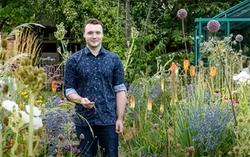 As part of a monthly series featuring the eight finalists in the 2020 BBC Gardeners World Magazine Gardens of the Year competition, Andy Gladman, a Crop Centre PhD student and his Leamington Spa ornamental allotment are the subject of March's edition.
As part of a monthly series featuring the eight finalists in the 2020 BBC Gardeners World Magazine Gardens of the Year competition, Andy Gladman, a Crop Centre PhD student and his Leamington Spa ornamental allotment are the subject of March's edition.
The six page article plots his journey,' driven from a lifelong passion for plants', especially kniphofia, echinops, verbena and buddleas and the set back of living in a top floor north facing flat, in transforming an overgrown allotment plot in 2018 from 'a field of couch grass and bindweed' to an 'astonishingly vibrant and drought tolerant garden'. With his interest in plant diversity there are 'around 100 cultivars of kniphofia (red hot poker') that he has been trying to accumulate and is planning on applying for a National Collection status for these and his echinops (globe thistle).
Working on a tight budget and with using materials that otherwise would go to waste as a very important aspect to him,' seed sowing and recycling have been key'. 'The entire path is made up of pavers from a fellow allotmenteer's old driveway' and both greenhouses, furniture in the summer house and one of the greenhouses and water trough are either secondhand or from charity shops.
Many of the plants are a haven for insects and the bees are everywhere. He noted a lot of butterfly diversity when taking part in the Big Butterfly Count 2020 and believes the allotment holders are pleased with the amount of pollinators his garden attracts to the allotments.
More information - Gardeners' World Magazine, March 2021, pages 72-77.
Andy Gladman is a PhD student with Dr Dave Chandler.
Identified: A mechanism that protects plant fertility from stress
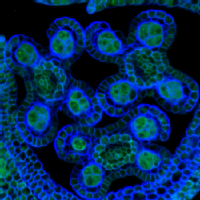 As temperatures rise due to global warming the need to protect plants from stressful conditions has increased, as stress can cause a loss in yield and cause further impact economically. A consortium led by Professor Jose Gutierrez-Marcos have successfully identified two proteins that protect crops from stress, which is key in safeguarding food production.
As temperatures rise due to global warming the need to protect plants from stressful conditions has increased, as stress can cause a loss in yield and cause further impact economically. A consortium led by Professor Jose Gutierrez-Marcos have successfully identified two proteins that protect crops from stress, which is key in safeguarding food production.
Press Release (1 March 2021)
New research finds no evidence that schools are playing a significant role in driving spread of the Covid-19 virus in the community
New research by epidemiologist Dr Mike Tildesley and colleagues has found that there is no significant evidence that schools are playing a significant role in driving the spread of the Covid-19 disease in the community, particularly in primary schools. However, careful continued monitoring may be required as schools re-open to stay well informed about the effect they have upon community incidence.
Press Release (15 February 2021)
Women in science, innovate in science
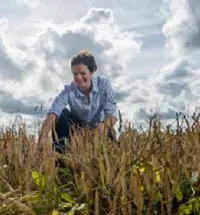 To celebrate International Day of Women and Girls in Science on 11 February 2021, young researchers at Warwick, including PhD student Rosanne Maguire, were asked about their hopes for their research and the importance of equality in their chosen field.
To celebrate International Day of Women and Girls in Science on 11 February 2021, young researchers at Warwick, including PhD student Rosanne Maguire, were asked about their hopes for their research and the importance of equality in their chosen field.
Article (11 February 2021)
University of Warwick signs agreement with agronomy specialist to bring UK beans to market
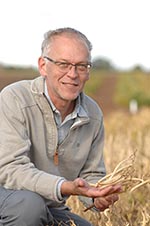 The University of Warwick’s research commercialisation wing, Warwick Innovations, has signed a contract with agronomy specialist Agrii to promote the commercial production of UK haricot beans developed by Professor Eric Holub from Warwick’s Crop Centre, part of the School of Life Sciences. Professor Holub has bred three haricot bean varieties which are adapted for growing in the UK climate and are more suited to standard farm machinery.
The University of Warwick’s research commercialisation wing, Warwick Innovations, has signed a contract with agronomy specialist Agrii to promote the commercial production of UK haricot beans developed by Professor Eric Holub from Warwick’s Crop Centre, part of the School of Life Sciences. Professor Holub has bred three haricot bean varieties which are adapted for growing in the UK climate and are more suited to standard farm machinery.
“Self-sufficiency in food production is important for reducing human impact on global climate. British-grown beans can help us shift our diets to a healthier future, adding to other UK ingredients to supply the growing trend of flexitarian diets with new markets like Brit-Mediterranean and Brex-Mexican style food.” Professor Holub.
Press Release (9 February 2021)

